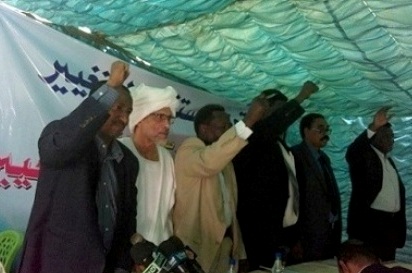Opposition FFC proposes merger of Sudan’s political and security talks but SPLM-N rejects
September 8, 2016 (KHARTOUM) – Chairman of the opposition alliance Future Forces of Change (FFC) Ghazi Salah al-Din Attabani said they handed the head of the African mediation Thabo Mbeki proposals to “avoid clogging” of the political process including merging the political and security talks.

In a statement extended to Sudan Tribune on Thursday, Attabani said the FFC handed Mbeki a number of proposals including the synchronized start of the political negotiations and the security arrangements talks to in order to avoid any adverse impact from one track on the other.
He pointed that the political talks could be launched through an unofficial consultative meeting among all political forces under the auspices of the AUHIP to discuss the outstanding issues pertaining to the dialogue conference including creation of conducive climate for dialogue, political guarantees for the rebel leaders and the recommendations of the government-led national dialogue.
It is noteworthy that the Sudan Call forces including the armed movements, National Umma Party (NUP) and the Sudanese Congress Party (SCoP) refuse to participate in the internal government-led dialogue and call for holding a preparatory meeting abroad.
Also, major political parties within the internal opposition umbrella National Consensus Forces (NCF) including the Sudanese Communist Party (SCP) and the Arab Ba’ath Party (ABP) refuse to join the internal dialogue.
Attabani added they demanded the AUHIP to merge the two negotiation tracks, saying the political and security talks are being conducted in parallel, not identical, way which produced a dichotomy that could lead to many problems in the future.
He pointed that talks in Addis Ababa are being brokered by the AU and attended by regional and international powers while there is no similar talks in Khartoum and “that would produce two parallel political processes”, saying that is why the two tracks must be merged in order to reach an agreement among a well known and recognized parties participating the dialogue.
According to Attabani, the proposals also stressed the need for the government to create a climate conducive for dialogue and allow freedoms particularly freedom of expression, assembly and press.
“These proposals enjoy strong support from several political forces inside [Sudan] and also from the majority of the political forces and armed movements that recently signed the Roadmap Agreement,” he said.
The FFC, including some 41 opposition groups, was launched last February in Khartoum and called on the others to join them to achieve the shared goal of regime change.
The new coalition was met with skepticism from some political parties as it included Islamists figures while other forces including the rebel Sudanese People’s Liberation Movement/North (SPLM-N) gave it an unenthusiastic welcome.
SPLM-N REJECTS FFC PROPOSAL
Meanwhile, the SPLM-N has warned against any political process that doesn’t stop the war and address the humanitarian issue saying it would be “doomed to failure”.
Responding to the FFC proposal, the movement described the humanitarian and security issues as the “backbone” of the talks, saying any credible political process can’t be launched without addressing these issues.
In a statement extended to Sudan Tribune on Friday, SPLM-N said the creation of conducive climate for dialogue has two wings including stopping the war and resolving the humanitarian issue besides allowing freedoms.
“The political process can’t take off without those two wings,” the statement read.
“Our priority in the SPLM-N is to stop the war as a gateway to the political process and the comprehensive solution and we wouldn’t participate in any political process that doesn’t begin by stopping the war,” the statement added.
The movement stressed that the ruling National Congress Party (NCP) has not yet taken a strategic decision to stop the war or allow freedoms, pointing to the massive human rights violations.
The statement pointed the breaking of the political process stalemate requires intensification of the internal and external pressures on the regime as well as raising mass movement to change the current balance of powers.
“The regime wouldn’t make any compromises whether we hold the preparatory meeting first or the cessation of hostilities second … the issue doesn’t depend on the technicalities of [how to conduct the talks] but on changing the balance of power” the statement read.
(ST)
